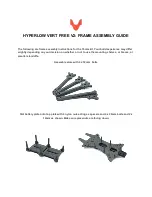
104
WARNING:
Some bicycle brakes, such as linear-pull and disc brakes, are extremely powerful. You should take extra care in
becoming familiar with these brakes and exercise particular care when using them. Applying these brakes too hard or too sud-
denly can lock up a wheel, which could cause you to lose control and fall.
When you apply one or both brakes, the bike begins to slow, but your body wants to continue at the speed at which it was
going. This causes a transfer of weight to the front wheel (or, under heavy braking, around the front wheel hub, which could
send you flying over the handlebars). A wheel with more weight on it will accept greater brake pressure before lockup; a wheel
with less weight will lock up with less brake pressure. So, as you apply brakes and your weight shifts forward, you need to shift
your body toward the rear of the bike, to transfer weight back on to the rear wheel; and at the same time, you need to both
decrease rear braking and increase front braking force. This is even more important on steep descents, because descents shift
weight forward. The keys to effective speed control and safe stopping are controlling wheel lockup and weight transfer. Prac-
tice braking and weight transfer techniques where there is no traffic or other hazards and distractions.
Everything changes when you ride on loose surfaces or in wet weather. Tire adhesion is reduced, so the wheels have less
cornering and braking traction and can lock up with less brake force. Moisture or dirt on the brake shoes reduces their ability to
grip. The way to maintain control on loose or wet surfaces is to go more slowly to begin with.
2. Adjusting your brakes
If either brake lever on your bike fails the Mechanical Safety Check you can restore brake lever travel by turning the brake
cable adjusting barrel counterclockwise, then lock the adjustment in by turning the barrel’s lock nut clockwise as far as it will
go. If the lever still fails the Mechanical Safety Check, or you have any question about whether your brakes are working prop-
erly have your dealer check the brakes.
D. Shifting
Your multi-speed bicycle will have a derailleur drivetrain, an internal gear hub drivetrain or, in some special cases, a combina-
tion of the two.
1. Why all those gears?
You will get the greatest fitness benefit, produce the greatest sustained power and have the greatest endurance if you learn to
spin the pedals at high revolutions per minute (called cadence) against low resistance. You will get the least fitness benefit and
have the least endurance by pushing hard on the pedals against heavy resistance.
?









































